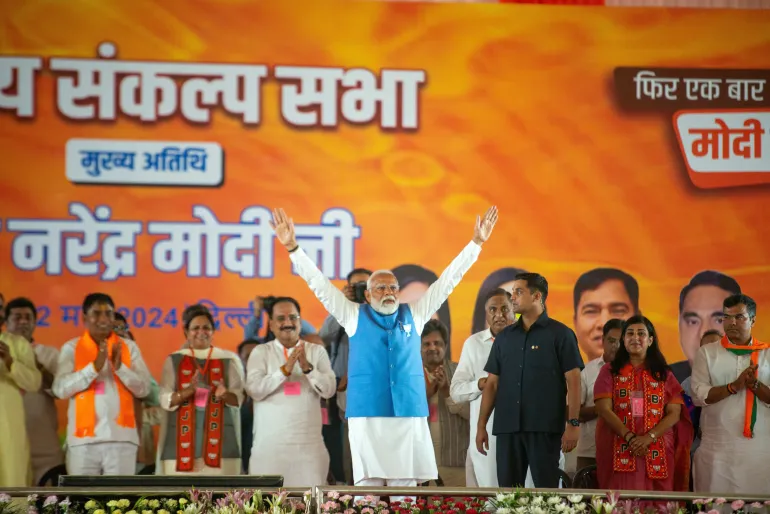The great paradox of the 2024 elections in India


Following the parliamentary elections in India, the Hindu nationalist leader Narendra Modi has lost his majority in the lower house. But his first political gestures suggest that he will make no changes to the way he exercises power and may even be strengthened on the international stage.
Stiff as a board. Despite the serious setback inflicted on him by the Indian electorate in the spring 2024 general elections, Narendra Modi does not seem inclined to change one iota. On 4th June, his political party, the Bharatiya Janata Party (BJP), won just 240 out of 543 seats in the Lok Sabha, the lower house of parliament, 63 fewer than in 2019 (a 20% drop). No fewer than 22 contesting ministers lost their own battles and yet, on the eve of his new term at the head of the world's most populous country, the Hindu nationalist leader refuses to repent.
As if nothing had happened, he was sworn in with pomp and circumstance on Sunday 9th June on the steps of the Rashtrapati Bhavan, the palace of the President of the Republic, in New Delhi. Appointed to the post of Prime Minister for the third time, a feat that several others before him had achieved, (the socialist Jawaharlal Nehru in 1962, his daughter Indira Gandhi in 1980 and the nationalist Atal Bihari Vajpayee in 1999), Mr. Modi was surrounded by his new government, in which the same faces appeared as before: the dreaded Amit Shah, the Islamophobic Home Minister who for the past five years has been responsible for a severe crackdown on all opponents of the regime, the indomitable Rajnath Singh as Defence Minister, the loyal Subrahmanyam Jaishankar as Foreign Minister, and Nirmala Sitharaman as a bland Finance Minister.
The team of 71 ministers includes only seven women and not a single Muslim, the faith to which 200 million Indians belong (14% of the population). In all, 86% of the ministerial portfolios have been given to members of the BJP, including Health, which goes to Jagat Prakash Nadda, hitherto president of the defeated party. The remainder have been distributed among some fifteen small parties that have come together in an unlikely coalition, giving Mr. Modi a fragile majority of 293 MPs. Compromise promises to be an impossible task for a man who has always concentrated power in his own hands and has never shared it with anyone else.
Among the regional figures who have rallied are Nitish Kumar, the leader of the state of Bihar known for having flipped his coat an improbable number of times; Chandrababu Naidu, the leader of Andhra Pradesh, a politician facing trial in several cases of misappropriation of public funds; and Eknath Shinde, the Maharashtra leader of a local far-right party, the Shiv Sena, which split in two in 2022 and whose other half sits in opposition alongside the Congress Party of the Gandhi family.
Maharashtra (128 million inhabitants) is one of India's three most populous states, along with West Bengal (104 million) and above all Uttar Pradesh (257 million). The BJP was defeated in all these three regions and in Uttar Pradesh, led by the ultra Hindu monk Yogi Adityanath, the result was especially humiliating. This state had sent the largest contigent of Hindu nationalist MPs to parliament in the last two national elections, in 2014 and 2019. The city of Ayodhya, where Narendra Modi inaugurated a Hindu temple being built on the ruins of a famous medieval mosque with great fanfare in January 2024, is located in Uttar Pradesh, where the prime minister thought he had found an electoral martingale, with the radicalisation of communalism exalted in favour of Hindu supremacy.
However, the ploy did not work. In Ayodhya, the BJP candidate was defeated. And in another symbolic constituency of Uttar Pradesh, that of the holy city of Varanasi, where Narendra Modi is the MP, he was re-elected by only 150,000 votes. This is not only his worst personal score in the city, but also the worst ever obtained by an Indian prime minister since independence in 1947. Defenders of freedom and democracy see this as a “wondrous moment”, to use the term used by political scientist Pratap Bhanu Mehta. “The air of despondency, the suffocating shadow of authoritarianism, and the nauseous winds of communalism have, at least for the moment, lifted”, he said the day after the results were published. The Modi “bubble” is deflating and the Hindu nationalist leader is “just another politician, cut to size by the people”.
It has to be said that the man in question, who for the past ten years has been engaged in an insane cult of personality, was possessed by such a sense of pride that he recently declared himself to be inhabited by a divine power. Before the death of his mother in December 2022, Narendra Modi had “a feeling of biological origin”. Afterwards, he said he “became convinced that it was God” who “sent” him to bring about a “new India”. Since this manifestation of hubris, the ballot box has spoken and the Prime Minister has come down to earth.
Essayist and political science professor Rajmohan Gandhi, grandson of Mahatma Gandhi, summed up the new situation very well. “It was not rational that earlier this year the prime Minister of a country facing multiple challenges took time off from his duties and acted as chief priest for the opening of a grand new temple. In a world which is interconnected 24x7, it is insane to think that in your own land you can practice supremacy over lesser mortals of a faith community different from yours, and yet demand equal rights for your faith community in other lands, and expect never to be called out”, he observes. By restoring the colours of the opposition, in particular those of the Congress Party, which now has around a hundred MPs, compared to 52 in the previous legislature, the voters wanted to put a stop to the “darkness and madness” that had taken hold of the regime, asserts Mr. Gandhi.
There is now every likelihood of a status quo in the country. According to Siddharth Varadarajan, director of the news website The Wire, one of the country's last independent media, Modi is “likely to be more aggressive” in the coming months: “This is a man who boasts of having a 1000-year plan for India and he is not going to abandon it so easily. The last world leader who dreamt of a millennium for his Reich ended up destroying his country and much more”, the journalist reminds us, referring to Hitler. This is all the more worrying because on the international stage, it is more than likely that, as Indian democracy raises its head and challenges its self-taught authoritarian Prime Minister, Europe and the United States will be even less vigilant than before about the abuses committed at home by Narendra Modi. This is not the least of the paradoxes of the 2024 elections.
Keywords: India, elections, Narendra Modi, BJP, Congress Party, Gandhi, Hindu, authoritarianism
All the publications express the opinions of their individual authors and do not necessarily reflect the views of CIDOB or its donors